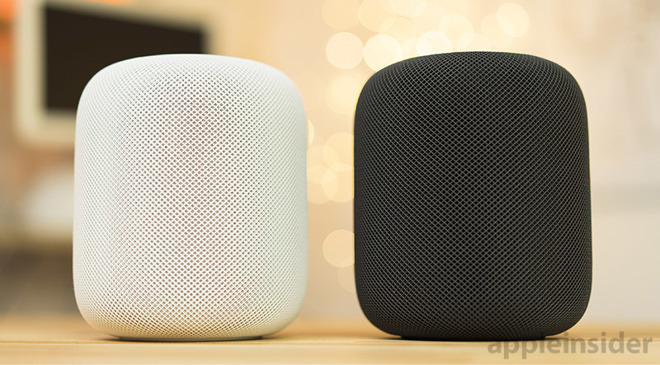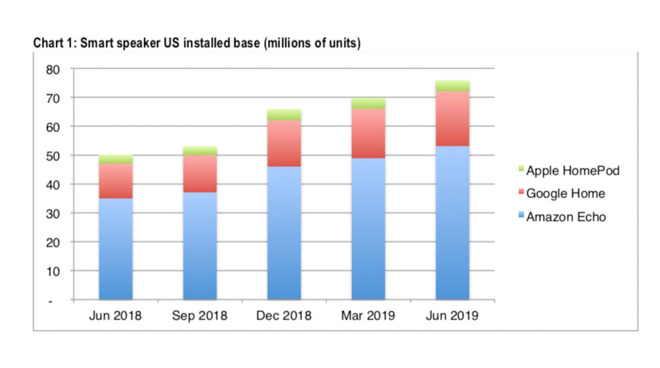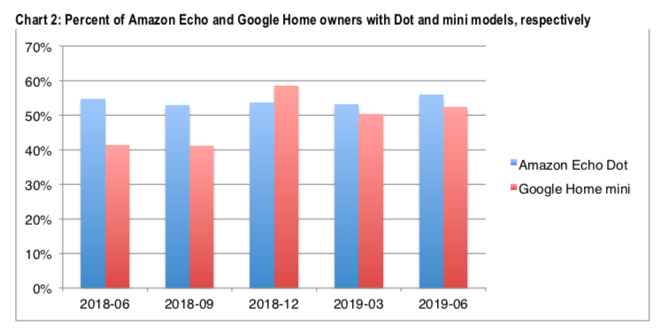Smart speaker market growing steadily but dominated by sub-$50 models
A new report by CIRP shows that price seems to be the driving factor behind smart speaker adoption and market growth, with over 50 percent of the market belonging to entry-level Amazon Echo and Google Dot and Mini devices.

According to Consumer Intelligence Research Partners, the U.S. installed base of smart speakers is now 76 million units, up from 70 million units in the March 2019 quarter, and 50 million in June 2018 quarter.
Amazon Echo currently accounts for 70 percent of the speakers with Google Home accounting for 25 percent. The Apple HomePod accounts for the final 5 percent.

"While the biggest growth in the market for smart speakers is in the holiday fourth quarter, Amazon Echo and Google Home continues to grow their installed bases in the past couple of quarters," said Josh Lowitz, Partner and Co-Founder of CIRP.

According to the report, the market has grown by 9 percent in the second quarter and over 50 percent year-over-year. All three major producers have maintained steady shares of the market and the competitive pricing of entry-level models drive new customers to try smart speakers.
But, as pointed out by CIRP, more than half of the existing market is at the cheapest entry point for the devices, around the $50 mark.
Apple's HomePod has had a permanent price reduction, following the original launch. The $299 price tag still means it's likely a less attractive option than both Google and Amazon's entry level speakers.
Occasional rumors have suggested that Apple may be working on a lower-cost HomePod, but there have been no iterations of the rumors as of late.

According to Consumer Intelligence Research Partners, the U.S. installed base of smart speakers is now 76 million units, up from 70 million units in the March 2019 quarter, and 50 million in June 2018 quarter.
Amazon Echo currently accounts for 70 percent of the speakers with Google Home accounting for 25 percent. The Apple HomePod accounts for the final 5 percent.

"While the biggest growth in the market for smart speakers is in the holiday fourth quarter, Amazon Echo and Google Home continues to grow their installed bases in the past couple of quarters," said Josh Lowitz, Partner and Co-Founder of CIRP.

According to the report, the market has grown by 9 percent in the second quarter and over 50 percent year-over-year. All three major producers have maintained steady shares of the market and the competitive pricing of entry-level models drive new customers to try smart speakers.
But, as pointed out by CIRP, more than half of the existing market is at the cheapest entry point for the devices, around the $50 mark.
Apple's HomePod has had a permanent price reduction, following the original launch. The $299 price tag still means it's likely a less attractive option than both Google and Amazon's entry level speakers.
Occasional rumors have suggested that Apple may be working on a lower-cost HomePod, but there have been no iterations of the rumors as of late.

Comments
I’m thinking $149 with discount into the $129 range.
Available by Christmas?
If Apple wants to grow services (Apple Music) they need to target more price points...
Just guessing, but I think he might have meant Apple never intended to compete in the $50 end of the connected speaker market. I would agree. Just like Apple never intended to compete in the low-end computer, phone, tablet, ("smart") watch markets. While iPods did get fairly affordable over time, they were still more expensive than most competitors that arrived. As we all know, Apple mostly doesn't give a rip about market share but revenue per unit. Can they sell enough to recoup the cost of investment (including man hours) and then enough to invest in the next gen/variants? Then great. If not, it'll get axed.
I have a feeling HP will slowly to catch on. I know I'm chomping at the bit for a couple, but financially, I'm a couple years out. And that's fine with me, I'd rather pay a fair price for something high-quality than fifty bucks for a piece of junk. But that's just me.
PS I can totally see Apple going the iPhone route and continue selling the previous model when the new gen comes out. Boom there's your lower cost option.
The Amazon Dot may have a tiny speaker but can be connected to a nice audio system of your choosing. Why listen to a crappy little Apple HomePod when you have serious money invested in an audio system?
I have a nice system set up in my home complete with Focal speakers and there is not a "smart speaker" at any price that will come near it in sound quality. I can easily add an Amazon Dot and make the thing a "smart speaker", but Apple chose not to give users that option.
I can already push music to that system via Bluetooth by having added an Audioengine BT module and connecting it with an optical audio link. I can stream music from my Apple TV, my Mac, my iPad Pro or my iPhone to that unit. That is a much more attractive option than the grossly overpriced HomePod.
The HomePod is a flop. Go into any Apple retail store and the least attended thing inside is that crappy little speaker. It is too expensive for teens and too cheesy and low quality for adults.
I would venture a guess that the overwhelming majority of AppleInsider subscribers/readers do not own or plan to buy one. I would further guess that more than a few have an Amazon device- quite possibly a Dot - in their home.
Apple never meant to make a cheap speaker that sits on your counter ready for cooking recipes or to sell you crap.
A better comparison would be Bluetooth speakers in general not echo dots that are handed out for free.
I can tell you with certainty that I’ve heard both the Google home mini and the Echo dot and they both sound like crap, compared to HomePod.
So the price IMO is well warranted, if listening to music or paired to your appleTV are your primary uses.
Now excuse me please as I "retreat to my dedicated listening room while enjoying a snifter of cognac". NOT
You have zero knowledge of how many HomePods Apple has sold or how much profit it has earned on them, yet you feel qualified enough on the subject to opine that "the product is a failure" simply because some third-party research firm (who is just as ignorant) declared that the HomePod has small market share of a market composed primarily of sub-$50 knockoffs.
Ok.
Ah, bringing the narrow viewpoint to the table yet again. No matter how many times it’s explained to you, you still don’t get it.
Apple doesn’t care about market share. It cares about profit share, which translates to grabbing the largest share of the most valuable customers and holding on to them. It does not care about grabbing the biggest share of people who don’t want to pay for anything, and the HomePod reflects that.
They don’t make cheap products because they’re not interested in cheap customers and razor-thin margins.
Apple could easily sell millions more HomePods, by knocking the price down to $20. Would that bring more people to the Apple ecosystem? Of course not! Because the people who only want to pay $20 for a smart speaker are unlikely to pay monthly for the wedge of subscriptions that Apple wants to sell them.
Why doesn’t Apple make a home theatre system? For the Sam reason Apple doesn’t get into televisions: a crowded field with razor thin margins.
Look at Spotify. Huge market share, but how much money are they making?
One of the very very few.
He’s right: Apple never intended to compete in the $50 speaker market.
They intended to dominate the $400+ market.
Before this can happen, they need the HomePod to allow for family use.